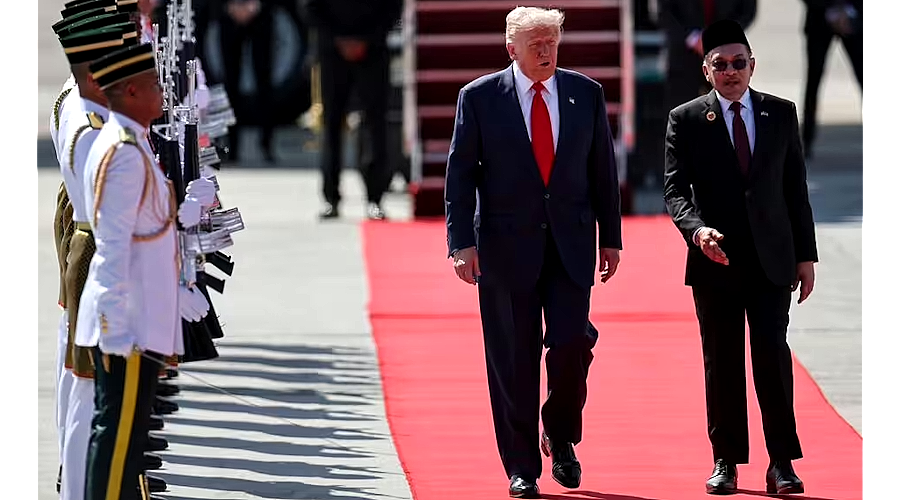
Terms of endearment
In diplomacy, terms of endearment could matter more than geopolitical grid lines. When leaders use language that conveys warmth and respect, they build trust and foster amity, paving the way to steer the stormy waters of geopolitical discord. This makes for easier and more productive dialogue and collaboration.
But such personal rapport cannot be forged simply on the anvil of bureaucracy playbooks or diplomacy manuals. You need personal chemistry between leaders to drive that rapport which then can significantly affect diplomatic outcomes.
And this was precisely what unfolded in yesterday’s encounter between Prime Minister Datuk Seri Anwar Ibrahim and President Donald Trump.
If there is anything predictable about Trump, it is his sheer unpredictability. It could have gone the other way but his arrival at KLIA yesterday was instead marked by a spontaneous overflow of flourish when he gamely joined the welcoming dancers, and waved, magnanimously, the flags of both nations.
And in an extraordinary display of camaraderie, he invited Anwar to ride with him in The Beast, all the way to the KLCC. This was no ordinary ride and here was no ordinary passenger.
As an astute, accomplished, and affable statesman, I dare say very few could hold a candle up to Anwar in the refined art of diplomatic engagement. So, in the pristine world of four-eyed meetings, the opportunities that this momentous ride offered would constitute its pièce de résistance.
These are terms of endearment that befit the accolade of diplomacy par excellence, which would have been impossible without the personal chemistry that sparked during that first face to face encounter.
For Anwar, the visit crowned nearly a year of persistent engagement with the White House, an initiative that began almost as soon as Trump was elected for a second term on 5 November 2024.
Engaging Trump
The logic was straightforward: to engage the new administration was to engage Trump himself. There could be no cut-outs, stand-ins or substitutes. It was clear he would again defy Washington’s conventions and, this time, do so with even greater panache.
Any attempt at second guessing Trumpian capriciousness would be a Sisyphean task and, if anything, he might well double down on it! But as it turned out, it’s more than a big sigh of relief, it’s a huge surge of gratification!
Even before Malaysia formally assumed the ASEAN chairmanship, the government understood that the success of its year at the helm would depend, in part, on how deftly it could engage the new occupant of the White House.
With President Joe Biden, ASEAN had begun to sense a certain weariness in American engagement, particularly towards the end of his term.
Biden skipped the ASEAN Summit in Jakarta in September 2023, sending Vice-President Kamala Harris instead—and adding insult to injury by appearing in Vietnam just days later.
Anwar’s own experience with Biden reflected that same lethargy. In the 26 months that he and Biden overlapped in office, the two never once spoke directly, despite efforts by officials on both sides to arrange a call.
With Trump, the contrast could not be starker. In the nine months since his inauguration, he and Anwar have already spoken on the phone three times. This was where the seeds for the terms of endearment were sown.
Yes, you reap what you sow but you could harvest more than you plant. Each conversation was candid, warm and even wry – a blend of transactional directness and genuine rapport that has underpinned what may prove one of the more consequential ASEAN-US engagements in recent memory.
Gaza and genocide
Getting on board with the United States is always a complicated matter for any Malaysian leader. This became even more so since the genocidal war in Gaza began in October 2023.
The utter impunity that Israel enjoyed under the Biden administration made it impossible to talk to America without the conversation being dominated by Palestine. During the 2023 APEC Summit in San Francisco, Anwar threw caution to the wind and, in Biden’s face, went full throttle on the catastrophe unfolding in Gaza.
Under Trump, there is no illusion that America’s fundamental stance on Israel would change. Yet there is at least a sense that his transactional, deal-making instincts make him less ideologically captive to that relationship—and that has proven to be an unexpected source of advantage.
For too long, successive American presidents have tried the same strategies while expecting different outcomes. With all due respect to the ghost of Henry Kissinger, whether in the Middle East, Europe or East Asia, Washington’s foreign-policy establishment has shown a stubborn fidelity to approaches that have repeatedly failed. Trump, by contrast, harbours a special disdain for such orthodoxy.
His willingness to meet Kim Jong Un may not have produced a lasting settlement, but it was at least an admission that previous attempts – predicated on the fantasy of North Korea surrendering its nuclear weapons – were acts of diplomatic insanity: doing the same thing and expecting different results.
And while many may wish the Gaza war had ended sooner, few could deny that Trump’s interventions hastened the ceasefire. He was willing to work with Arab capitals while pressuring Benjamin Netanyahu, something his predecessors rarely dared because they were constrained by Israel’s clout in Congress – a reality only recently mentionable in polite Washington company because it has become painfully obvious.
Kuala Lumpur Peace Accord
That same unconventional instinct has been applied to Southeast Asia. When Thailand and Cambodia exchanged fire across their disputed border earlier this year, Trump and Anwar played complementary roles.
Anwar offered Malaysia and ASEAN as a neutral venue for talks; Trump offered trade deals – with the implied threat of none if the guns did not fall silent, although that was not quite a “guns or butter” binary. Nevertheless, despite detractors (mostly anti-Trump Western media) panning the deal, yesterday’s signing of the “KL Peace Accord” underscores a formal step toward restoring peace between the two ASEAN member states.
For Malaysia, hosting Trump was not merely a matter of protocol but of positioning—a test of whether a Southeast Asian country could steer both America’s regional role and a president wary of multilateralism towards constructive ends. Anwar’s preparations and handling of the visit, at once courteous and disciplined, helped make it look effortless, not to mention the allure of his personal charm.
Beyond the peace accords, Trump’s visit yielded tangible results for Malaysia. Despite its asymmetrical nature, the Malaysia–US Agreement on Reciprocal Trade (ART) offers tangible advantages for Malaysian consumers, businesses, and institutions.
The new trade deal and partnership on critical minerals will give Malaysia a stronger position within the evolving architecture of US-anchored supply chains, reinforcing our commitments to international standards in steel, telecommunications security, and logistics.
The ART provisions could yield long-term benefits if implemented effectively. Malaysia’s acceptance of US FDA approvals ensures faster availability of innovative medicines and devices without duplicative testing.
But it’s a fool’s errand to imagine everything is going honky dory with this trade deal. For one, critics point out that although presented as a reciprocal pact, the provisions reveal a structural imbalance: Malaysia commits to broad liberalization and regulatory alignment, while the United States retains wide discretion and limited obligations.
We shall take this up in another forum. For now, suffice it to say that the ART also provides greater assurance to investors that Malaysia’s access to the American market remains stable. The task ahead is to sustain this engagement and, over time, to secure more favorable trade terms and gradually ease the barriers that still limit market access.
Geopolitical significance
Trump’s visit has set a precedent with greater geopolitical significance. Trump has now attended an ASEAN summit within the first year of his second term. The challenge will be to keep ASEAN on his diplomatic calendar, though this will become harder as the administration’s attention shifts towards the mid-term elections in 2026.
That responsibility will fall to the Philippines, which inherits the ASEAN chairmanship next year. It will probably not have the advantage of a peace accord to sign or a trade deal to unveil, and ASEAN will continue to bear the brunt of the absence of China’s president, who routinely sends his premier in his stead, which is not to say that Li Qiang is inconsequential.
The attraction, therefore, must lie in ASEAN’s geoeconomic weight—in showing that the region remains worth a place on Washington’s crowded schedule. By the end of the day, it was clear that Trump’s visit had gone better than almost anyone expected.
There was praise—for Malaysia’s leadership, for ASEAN’s unity, and for Anwar personally, whom Trump described as “a great historic figure” for his role in brokering the Thai-Cambodian peace. What appeared seamless was in fact the result of months of quiet preparation and careful statecraft, fortified with diplomacy’s terms of endearment and a delicate blend of personal chemistry and rapport.
(Datuk Prof Dr Mohd Faiz Abdullah is Chairman of the Institute of Strategic and International Studies, Malaysia.)
ADVERTISEMENT
ADVERTISEMENT








































